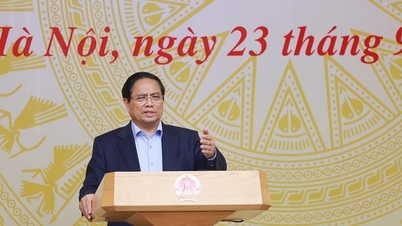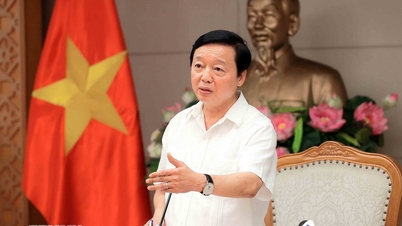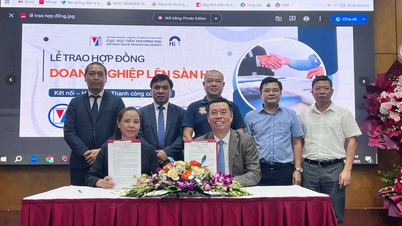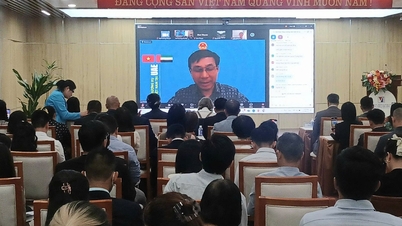From inherent existence

Resolution No. 68-NQ/TU dated May 4, 2025 of the Politburo on private economic development sets a target that by 2030 Vietnam will have about 2 million enterprises operating in the economy. However, up to now, according to statistics of the Ministry of Finance , there are only about 940,000 enterprises in operation, which means that in the next 5 years, Vietnam must have more than 1 million private enterprises operating to achieve the set target. That means that each year Vietnam must have 200,000 more enterprises operating in the economy.
Pointing out the bottlenecks that prevent the private sector from entering the market, CEO Luu Thi Thanh Mau, Vice President of the Vietnam Young Entrepreneurs Association, emphasized that these are complicated administrative procedures, lack of policy feedback mechanism from the grassroots level, difficulties in accessing resources, and especially legal gaps with innovation and digital assets.
In addition, bottlenecks include overlaps and inconsistencies between laws; cumbersome and time-consuming administrative procedures; the risk of "criminalizing" economic and trade relations; and legal gaps in new areas such as digital assets, innovation, and green transformation.
Mr. Nguyen Ba Diep, co-founder of MoMo Wallet, pointed out systemic challenges in the private sector, including the lack of quality human resources; entangled institutions and procedures, uneven infrastructure and ecosystem; difficulty accessing capital; and limited financial confidence in innovative businesses.
Meanwhile, Mr. Nguyen Van Khoa - Vice President of the Vietnam Young Entrepreneurs Association said: "If there are appropriate policies, financial technology will become a driving force for digital financial growth and contribute to helping many components participate in the mainstream financial flow, thereby promoting private economic development in the spirit of resolutions of the Party and State".
And innovations, breakthroughs
Listening to voices from the grassroots, the Ministry of Finance has proposed a series of mechanisms and policies to create a "push" for private enterprises to develop strongly in the coming time.
The latest draft Decree guiding the implementation of a number of articles of Resolution No. 198/2025/QH15 dated May 17, 2025 of the National Assembly on a number of special mechanisms and policies for private economic development developed by this agency focuses on major groups of mechanisms and policies on land access; tax incentives; support for science and technology, innovation, digital transformation and human resource training; support for training on business administration, accounting, tax, human resources for small and micro enterprises, business households, individual businesses...
Previously, land lease from investors, land access for small and medium enterprises, high-tech enterprises, and innovative startups were not preferential, now the Ministry of Finance proposes that the Provincial People's Committee must determine the land fund in industrial parks and industrial clusters for high-tech enterprises in the private economic sector, small and medium-sized enterprises, and startups to lease. In addition, there is a support level for reducing land rent and sub-lease in technology parks by at least 30% of the land rental and sub-lease price.
The draft decree also proposes that small and medium-sized enterprises, supporting industry enterprises, and innovative enterprises receive support and reduced public land rents. Provincial People's Committees will specify the list of public assets for lease, criteria, support levels, forms of support, procedures for leasing each type of asset as prescribed for businesses to register.
In addition to policies on land access, innovative start-ups are proposed to be exempted from corporate income tax for 2 years and have their tax payable reduced by 50% for the next 4 years for this income. Small and micro enterprises, business households and individual businesses are provided with free digital platforms and accounting software.
According to the Ministry of Finance, implementing support policies may reduce revenue in the short term. But in the long term, businesses will have the opportunity to expand production and business, contributing more to the budget and socio-economic development.
The innovations in the latest Draft Decree guiding the implementation of a number of articles of Resolution No. 198/2025/QH15 dated May 17, 2025 of the National Assembly on a number of special mechanisms and policies for private economic development are agreed and supported by the majority of provinces and cities, including Hanoi. However, the Vietnam Confederation of Commerce and Industry (VCCI) requested the Ministry of Finance to stipulate more clearly and specifically the cases in which enterprises are entitled to a reduction in public land rent, as well as the implementation procedures and provide detailed instructions for localities to avoid confusion when implementing in practice.
From the business perspective, Mr. Nguyen Van Hoi, Director of Thai Nam Production and Trading Company Limited, said that currently, Vietnam has 98% small and medium enterprises, of which nearly 70% are micro enterprises; individual business households account for about 94% of the total number of private economic establishments. The average capital and labor of each private enterprise is very low. Mr. Nguyen Van Hoi expressed his wish to have more policies to expand capital access channels for enterprises, creating momentum for acceleration and breakthrough.
Source: https://hanoimoi.vn/mo-duong-cho-1-trieu-doanh-nghiep-tu-nhan-gia-nhap-thi-truong-717100.html


![[Photo] Prime Minister Pham Minh Chinh chairs the 14th meeting of the Steering Committee on IUU](https://vphoto.vietnam.vn/thumb/1200x675/vietnam/resource/IMAGE/2025/9/23/a5244e94b6dd49b3b52bbb92201c6986)

![[Photo] General Secretary To Lam meets voters in Hanoi city](https://vphoto.vietnam.vn/thumb/1200x675/vietnam/resource/IMAGE/2025/9/23/d3d496df306d42528b1efa01c19b9c1f)

![[Photo] Editor-in-Chief of Nhan Dan Newspaper Le Quoc Minh received the working delegation of Pasaxon Newspaper](https://vphoto.vietnam.vn/thumb/1200x675/vietnam/resource/IMAGE/2025/9/23/da79369d8d2849318c3fe8e792f4ce16)
![[Photo] The 1st Congress of Party Delegates of Central Party Agencies, term 2025-2030, held a preparatory session.](https://vphoto.vietnam.vn/thumb/1200x675/vietnam/resource/IMAGE/2025/9/23/e3a8d2fea79943178d836016d81b4981)






























































































Comment (0)